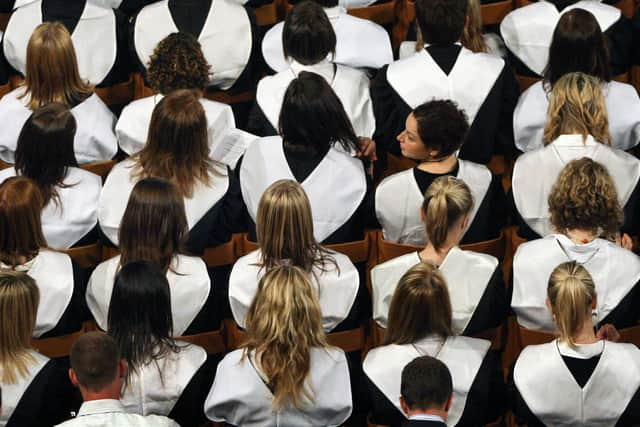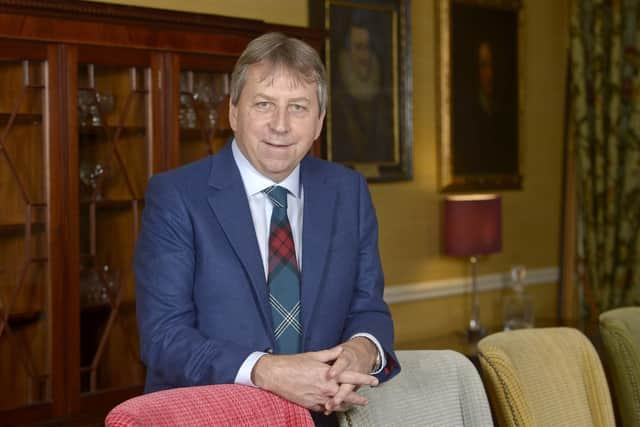Exclusive:Edinburgh University principal tells SNP minister it stands ready to take more Scottish students if ‘cap’ is lifted
The principal of Edinburgh University has said the institution has capacity for more Scottish students if the SNP Government lifts a controversial “cap” on numbers.
The Scotsman has learned Sir Peter Mathieson told education secretary Jenny Gilruth the proportion of Scottish students at the prestigious institution could rise “higher” than the current 30 per cent, if restrictions linked to the free tuition policy were eased.
Advertisement
Hide AdAdvertisement
Hide AdConservative MSP Liam Kerr said the remarks showed how universities wanted more Scottish students, but the Government’s funding model was “forcing them to turn young Scots away”.


Under the SNP’s free tuition policy, universities are only given funding for a certain number of Scottish students, which effectively creates a limit on the number of Scottish-domiciled students who can be taught at each institution.
As well as the cap, the Government confirmed in January that it would no longer be funding an additional 1,200 places for Scots, which were created during the pandemic in the wake of the Scottish Qualifications Authority (SQA) exam results fiasco.
Budget cuts, meanwhile, have resulted in the amount of funding per student falling by 19 per cent in real terms over the past decade, with a further cash terms reduction of 6 per cent for the coming year.
It comes as universities face intense pressure as UK immigration restrictions lead to a downturn in international students, who pay high fees and help plug the funding shortfall for the teaching of Scots. It has emerged these issues, and more, were discussed by Sir Peter and Ms Gilruth at a meeting on January 11.


Minutes from the talks show the Edinburgh University principal “noted his desire to see a well funded higher education system, should the current tuition fees policy in Scotland remain in place”.
He also “expressed concern at the continued risk to the unit of resource, and the extent to which international student fee income, along with other income streams such as accommodation and events, are cross-subsidising teaching and research”.
On places for Scots, the note said: “PM [Peter Mathieson] said that around 30 per cent of Edinburgh Uni students are Scottish domiciled, and could be higher if there was not a ‘cap’ on this number due to the tuition fees policy.”
Advertisement
Hide AdAdvertisement
Hide AdMr Kerr, Scottish Conservative education spokesman, said the SNP’s cap on university places for home-grown students was damaging the educational opportunities of Scottish youngsters, as well as Scotland’s key public services, and economic growth.
“Our universities want to take more Scottish students, but the Nationalists’ chronic underfunding of higher education and arbitrary cap is forcing them to turn young Scots away,” he said. “That has an even greater impact next year due to the SNP's cut of at least 1,200 funded places for Scots.
"What is clear is that the SNP have no plan for a properly funded, sufficiently resourced higher education system and are just making up policy as they go along.
"As well as being unfair on Scottish students and the universities themselves, this has huge knock-on effects, such as leaving the country short of professions such as doctors, nurses and teachers whilst under resourcing public services and failing to generate a vibrant Scottish economy
“SNP ministers should be heeding the warnings of experts like Peter Mathieson rather than burying their heads in the sand.”
As well as funding models, Sir Peter discussed the impact of Brexit with Ms Gilruth, saying the loss of the EU’s Horizon research and innovation scheme for a number of years had “affected UK universities’ leadership role in the programme”.
He also said both the UK government’s Turing Scheme, and the Scottish Government’s Scottish Education Exchange Programme, could “not replicate the benefits of Erasmus+”.
On Scottish schools, Sir Peter suggested there was a “lack of equity of access to a range of senior phase qualifications across different parts of Scotland”.
Advertisement
Hide AdAdvertisement
Hide AdThe minutes show he also noted “his preference” for the four-year degree model in Scotland compared to three years in England, as has St Andrews University principal Dame Sally Mapstone.
And the Edinburgh University vice chancellor played down the impact of “widening access” targets on places for middle-class and wealthier Scots, saying the “media suggestion that students from less deprived backgrounds were being ‘squeezed’ out of university places was overstated”.
The SNP replaced Labour’s graduate endowment scheme after coming to power in 2007. Free tuition means Scottish students graduate with far less debt than their English counterparts, who pay fees. The average for Scots last year was £15,430, compared to £44,940 in England.
However, concerns have been raised about the future of the policy in Scotland, which costs about £900 million per year, as budgets are squeezed.
Last year, Sir Peter suggested there needed to be “calm consideration” of higher education funding, claiming “talent and money are leaving Scotland”.
The outgoing director of Universities Scotland, Alastair Sim, used an article in The Scotsman last month to warn that without sustainable funding, universities would have to make “increasingly difficult decisions about course closures, job losses, and erosion of the student experience”.
Since then, Robert Gordon University in Aberdeen has opened a voluntary severance scheme for up to 220 staff as it seeks to plug an £18m hole in its finances.
Even Ms Gilruth has admitted the free tuition policy creates “challenges” for universities. However, First Minister Humza Yousaf has said abolishing tuition fees was “one of my party’s proudest achievements”.
Advertisement
Hide AdAdvertisement
Hide AdA Scottish Government spokesperson said the body was “resolute in its commitment to free tuition”. “The latest data shows since this policy was put in place, the number of Scottish students entering university has increased by 31 per cent and Scotland’s student debt levels are the lowest in the UK, almost three times lower than in England,” the spokesperson said.
“We are also seeing record numbers of young people aged 19 and under securing a university place in Scotland, as well as record numbers of students from our poorest communities as a result of the Scottish Government’s commitment to widening access to university.”
Comments
Want to join the conversation? Please or to comment on this article.
